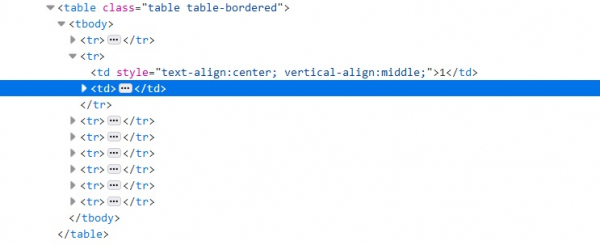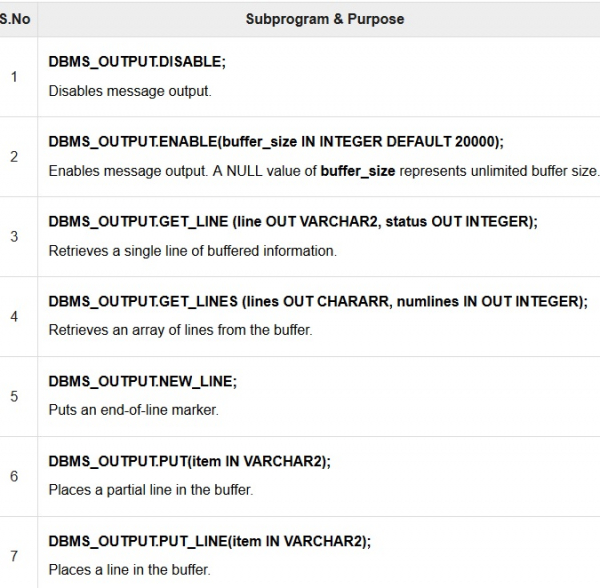使用 Cypress 处理 Web 表格
可以使用 Cypress 处理 Web 表格。Web 表格可以分为两种类型:静态和动态。静态 Web 表格的行数和列数是固定的。而动态 Web 表格的行数和列数则不是固定的。
为了在表格中识别特定列的值,我们需要借助 CSS 选择器。表格结构的 HTML 由 <table> 标签、<tr> 标签和 <td> 标签组成。行由 <tr> 表示,列值由 <td> 表示。
借助 CSS 中的 nth-child 概念,我们可以识别特定列的所有值。例如,对于一个有两列的表格,为了获取第一列的所有值,CSS 应该为 tr td:nth-child(1)。下面显示了表格 HTML 结构示例:

现在,要检索同一行下一列单元格中的值,我们必须移动到第二列。在 Cypress 中,我们有 next() 命令可以移动到 DOM 中紧跟其后的兄弟节点。next() 命令只有与 get() 命令一起使用时才有效。
语法
.next() , without arguments. .next(selector/options), with argument. next(selector, options), with arguments.
如下所示,可能有两种类型的选项可以修改 .next() 命令的默认行为:
log – log 的默认值为 true。
timeout – timeout 参数的默认值为 defaultCommandTimeout(4000 毫秒)。这是等待 .next() 完成的持续时间。
示例
处理 Web 表格的代码实现。
describe('Tutorialspoint Test', function () {
// test case
it('Test Case4', function (){
cy.visit("https://tutorialspoint.com/plsql/plsql_dbms_output.htm");
// identify the second column for all the rows
cy.get('.table.table-bordered > tbody > tr > td:nth-child(1)').each(($el,
index, $list) => {
// grabbing all text from second column
const txt = $el.text();
// checking the matching condition
if (txt.includes('1')){
// capturing the next sibling with the help of next() method
cy.get('.table.table-bordered > tbody > tr > td:nth-child(1)')
.eq(index).next().then(function(desc){
// capturing the text of next sibling
const rsl = desc.text();
//assertion to verify the text
expect(rsl).to.contains('DBMS_OUTPUT.DISABLE');
})
}
})
});
});上面代码实现中使用的 Web 表格:


广告

 数据结构
数据结构 网络
网络 关系型数据库管理系统 (RDBMS)
关系型数据库管理系统 (RDBMS) 操作系统
操作系统 Java
Java iOS
iOS HTML
HTML CSS
CSS Android
Android Python
Python C 编程
C 编程 C++
C++ C#
C# MongoDB
MongoDB MySQL
MySQL Javascript
Javascript PHP
PHP